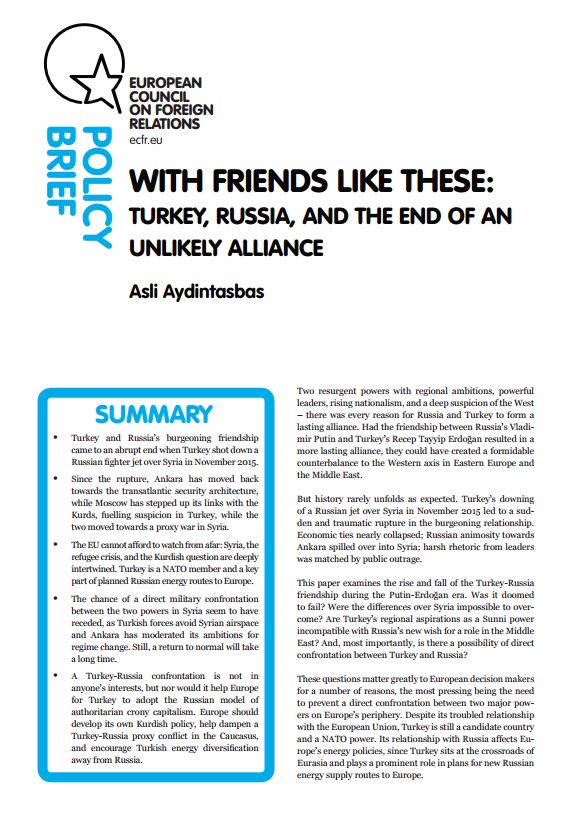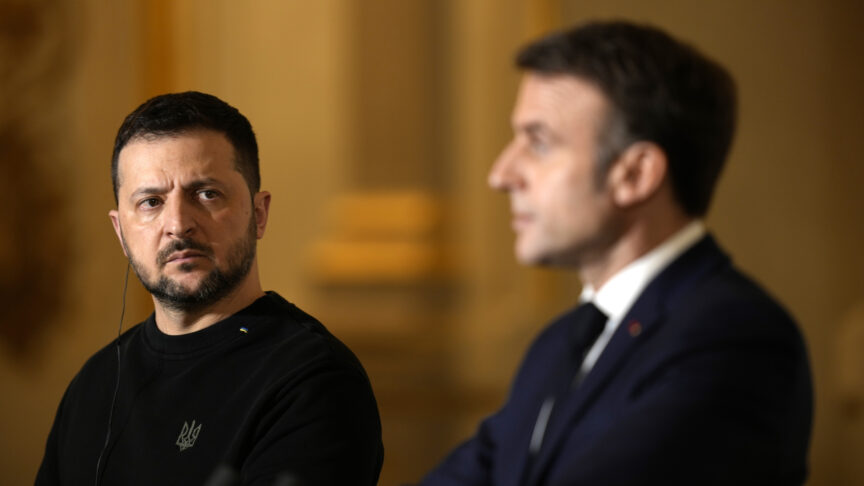With friends like these: Turkey, Russia, and the end of an unlikely alliance
The growing friendship between Russia and Turkey in recent years was a problem for Europe. But their recent bust-up is an even bigger one.
The growing friendship between Russia and Turkey in recent years was a problem for Europe. But their recent bust-up – after Turkey shot down a Russian fighter jet over Syria in November 2015 – is an even bigger one.
The two countries were drawn together in the last decade by growing economic ties and the rapport between their strongman leaders, threatening to create an anti-Western axis on Europe’s borders. But the downing of the jet thrust them into a confrontation that could spiral into proxy war in Syria and damage Europe’s effort to cope with the refugee crisis, according to a new paper from the European Council on Foreign Relations.
“With friends like these: Turkey, Russia, and the end of an unlikely alliance”, argues that Europe can’t afford for their conflict to grow more intense. The Syrian war, the refugee crisis, and the Kurdish question are deeply intertwined. And Turkey is not only a NATO member and EU candidate, but a key part of planned Russian energy routes to Europe.
Tensions first began to rise as the one-time friends were sucked into the regional struggle for Syria – while Russia backed Assad, Turkey agitated for regime change. As the alliance unravelled, Moscow broke the silent pact that neither side would support the other’s separatists, and made moves to befriend the Kurds. For its part, Ankara slunk back towards NATO and the West.
An all-out clash between two major powers on Europe’s borders is not in anyone’s interest. The chance of a direct military confrontation between the two powers has receded – for now – as Turkish forces avoid Syrian airspace and Ankara moderates its ambitions for regime change. Still, a return to normal will take a long time.
Europe should take this chance to push Turkey in the right direction – back towards democracy and European values, and away from Russian-style nationalism and crony capitalism. The paper argues that Europe should work to draw Turkey back into its sphere, building on the refugee deal and visa liberalisation, and encourage Ankara to diversify its energy supplies away from Russia.
At the same time, Europe should increase its role in the Syria talks, helping to de-conflict Russian and Turkish actions in the country. It should develop its own Kurdish policy, facilitating talks between Turkish and Syrian Kurdish forces, to help reduce tensions within Turkey and ensure that Europe is not left out of the high-stakes game that the US and Russia are playing in the region.
Author Asli Aydintasbas said:
“Turks and Russians have found the perfect enemy in one another, providing an excuse for their overseas adventures. For Russians, Turkey is once again ‘the sick man of Europe’ – a term Tsar Nicholas I coined for the Ottomans before the Crimean War– that needs to be reminded of its limitations. For Turks, Russia provides a convenient excuse not to own up to its mistakes on the Kurdish issue and its failing Syrian policy.”
“A reconciliation is unlikely in the short term, barring a public mea culpa by Erdoğan or a major reversal in his Syria policy, dropping plans for regime change and the creation of opposition-controlled zones. Efforts to de-escalate are evident in both Ankara and Moscow – but Syria remains a quicksand that could engulf both powers. No one can guarantee that Russia would not shoot down a Turkish fighter jet tomorrow if one flew over Syrian territory. But a more likely scenario is avoidance, a gradual return to economic activity, and over the next few years, begrudging acceptance of one another.”
“Europe has a vested interest in Turkey’s economic well-being, stability, and political model, as it is a significant NATO ally and a candidate for EU membership. Turkey’s burgeoning alliance with Putin’s Russia was an unrecognised problem for Europe because it meant the rise of a consciously illiberal axis that positioned itself as an alternative to the European model. However, Turkey’s falling out with Russia has not resulted in Ankara’s immediate return to European values.”
“Europe also has much at stake in the Syrian conflict, given the impact of the refugee crisis. This is particularly the case in northern Syria, where the Turkish-Russian rivalry is playing out and the US is focusing its efforts against ISIS. However, Europeans are largely absent from the international debate on Syria. Europe should start thinking about bringing stability to the country, not just counting the number of refugees.”
The European Council on Foreign Relations does not take collective positions. ECFR publications only represent the views of their individual authors.



